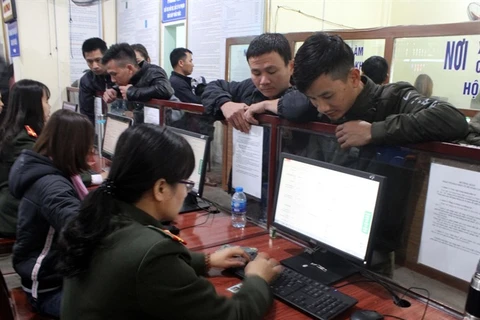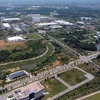 The biometric authentication system, which automatically scans electronic identity cards in the aviation security check process, begins in early February. (Photo: VietnamPlus)
The biometric authentication system, which automatically scans electronic identity cards in the aviation security check process, begins in early February. (Photo: VietnamPlus) Hanoi (VNA) - The Cat Bi International Airport in the northern coastal city of Hai Phong has piloted a biometric authentication system for passengers who use electronic identity cards in the aviation security check process.
Since the first day of February, the Cat Bi International Airport has used facial recognition cameras for air travel procedures and operated a separate lane dedicated to domestic air passengers using electronic identity cards (ID).
As a result of the pilot project, the number of tested passengers has so far amounted to 758, with 746 ID successfully recognised or 98.4%. Meanwhile, the rate of face recognition by cameras was 100%. The average time to read an ID card and boarding pass is approximately 15 seconds per passenger while the average time to process one passenger is 60 seconds.
The test results show that the system provided good support for aviation security forces in passenger control, said the leaders of the Airports Corporation of Vietnam (ACV). However, there are still some problems such as the slow speed of reading electronic ID cards, especially cards that are faulty, dirty or with blurred codes. In the next phase, Cat Bi airport will research and develop automated inspection devices that do not require the control of aviation security personnel in order to reduce human resources.
 Air passengers go through the boarding procedures using the electronic ID application. (Photo: VietnamPlus)
Air passengers go through the boarding procedures using the electronic ID application. (Photo: VietnamPlus) In addition, ACV has established a system connecting the airport with the citizen identity database of the Ministry of Public Security to control domestic air passengers, enhancing accuracy, preventing and promptly detecting cases where passengers use counterfeit documents to travel, and screening prohibited individuals.
VeriPAX software developed by ACV is designed to display all information read from ID cards and itinerary information connected with the list of passengers who have checked in to compare boarding passes with passenger flights.
VeriPAX also connects to the database of a list of those banned from flying of the Civil Aviation Authority of Vietnam (CAAV) so as to quickly identify whether the passenger is banned from flight or not.
In addition, the software has a warning feature in case passengers need to have their baggage visually checked as well as processing passengers using other types of identification papers.
 Aviation security personnel verify the authenticity of passengers before they proceed to the security screening at the Noi Bai International Airport in Hanoi (Photo: VietnamPlus)
Aviation security personnel verify the authenticity of passengers before they proceed to the security screening at the Noi Bai International Airport in Hanoi (Photo: VietnamPlus) At passenger security checkpoints, the aviation security officer will scan passenger ID cards and boarding passes with specialized devices to match with passenger faces.
The system authenticates ID cards and returns results of passenger information verification and itinerary information, and matches with the no-fly list or mandatory visual check and visual check-in baggage.
If the system records the information on the ID cards and the face image matches the journey information, aviation officers will let the passengers move into the screening area.
Previously, CAAV coordinated with ACV to guide Van Don International Airport in Quang Ninh province and other relevant offices to deploy biometric authentication upon arrival for Vietnamese citizens at airports.
Van Don International Airport will complete the pilot implementation of passenger biometric authentication by machine by the first quarter of this year and report to CAAV./.
| The CAAV leaders have stated that in the first quarter of 2023, they will pilot biometric authentication for citizens going through air travel procedures. They will provide a preliminary report to the Ministry of Transport on the results and propose solutions. By the beginning of the second quarter, a conference will be held to exchange views and reach a consensus on the requirements/regulations and directions for the application of the biometric authentication for air passengers. |






















